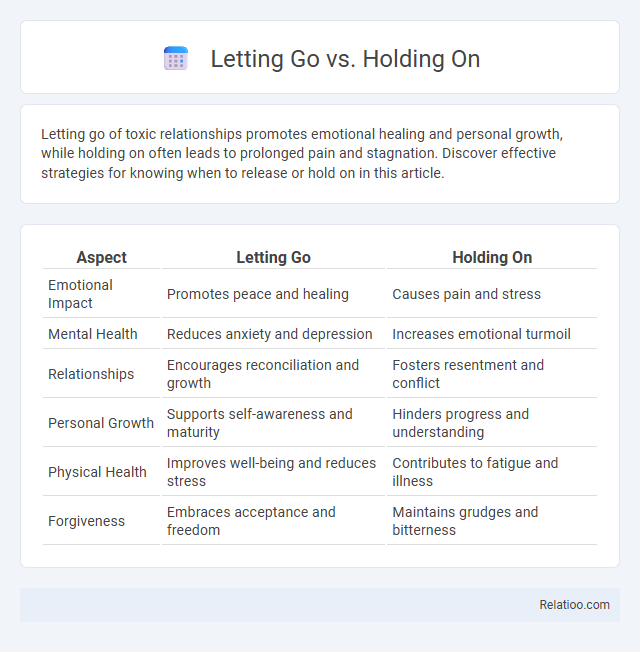Letting go of toxic relationships promotes emotional healing and personal growth, while holding on often leads to prolonged pain and stagnation. Discover effective strategies for knowing when to release or hold on in this article.
Table of Comparison
| Aspect | Letting Go | Holding On |
|---|---|---|
| Emotional Impact | Promotes peace and healing | Causes pain and stress |
| Mental Health | Reduces anxiety and depression | Increases emotional turmoil |
| Relationships | Encourages reconciliation and growth | Fosters resentment and conflict |
| Personal Growth | Supports self-awareness and maturity | Hinders progress and understanding |
| Physical Health | Improves well-being and reduces stress | Contributes to fatigue and illness |
| Forgiveness | Embraces acceptance and freedom | Maintains grudges and bitterness |
The Psychology Behind Letting Go and Holding On
The psychology behind letting go versus holding on reveals that clinging to grudges often stems from unresolved emotional pain and a desire for control or justice, which can perpetuate stress and hinder personal growth. Letting go involves cognitive reframing and emotional regulation, allowing you to release negative attachments and foster psychological resilience. Your mental well-being improves as you shift focus from past grievances to present healing, enabling healthier relationships and increased emotional freedom.
Benefits of Letting Go: Emotional Freedom
Letting go promotes emotional freedom by releasing the burden of resentment and anger, which often lead to chronic stress and emotional exhaustion. This act enhances mental clarity and fosters a more positive mindset, enabling healthier relationships and personal growth. Holding on to grudges traps individuals in negative emotions, whereas choosing to let go frees the mind and heart for forgiveness and inner peace.
The Cost of Holding On: Stress and Anxiety
Holding on to grudges can significantly elevate your stress and anxiety levels, disrupting mental and physical health by maintaining a state of chronic tension. This ongoing emotional burden consumes cognitive resources, reducing your ability to focus and diminishing overall well-being. Learning to let go promotes emotional freedom and resilience, empowering you to regain peace and improve your quality of life.
Identifying What to Release and What to Keep
Recognizing what to release versus what to keep hinges on evaluating the emotional impact and growth potential tied to each experience. Holding on to grudges often fuels negativity and blocks personal healing, whereas letting go enables your mental clarity and promotes peace. You maintain valuable lessons and relationships by discerning when forgiveness fosters resilience instead of resentment.
Common Fears Associated with Letting Go
Common fears associated with letting go include the fear of loss, uncertainty, and vulnerability, which can make holding on to past hurts or grudges feel safer. You may worry that releasing negative emotions means forgetting or invalidating your experiences, yet clinging to grudges often perpetuates emotional pain and hinders personal growth. Understanding these fears helps you move toward healing by embracing acceptance and emotional freedom.
When Holding On Becomes Unhealthy
Holding on to past hurts can lead to emotional distress, affecting your mental health and relationships. When holding on becomes unhealthy, it often turns into a grudge that fosters resentment, preventing healing and personal growth. Letting go frees your mind from negativity, allowing you to focus on positive experiences and achieve emotional balance.
Strategies for Healthy Release
Effective strategies for healthy release involve recognizing your emotions and choosing to let go of resentment rather than holding on to grudges that damage your well-being. Practicing mindfulness and self-compassion helps in reframing negative experiences and fostering emotional resilience. You can cultivate peace by setting boundaries, seeking support, and focusing on personal growth instead of dwelling on past hurts.
The Role of Acceptance in Moving Forward
Acceptance plays a crucial role in moving forward by allowing individuals to release grudges and the emotional burdens of holding on to past hurts. Embracing acceptance fosters emotional healing and cultivates resilience, enabling healthier relationships and personal growth. Letting go through acceptance transforms pain into empowerment, facilitating a transition toward peace and renewed optimism.
Building Resilience Through Letting Go
Building resilience through letting go involves releasing grudges and emotional burdens that hinder personal growth and mental well-being. Holding on to resentment creates stress and blocks the ability to adapt to change, while letting go fosters emotional freedom and strengthens coping mechanisms. Studies in psychology demonstrate that forgiveness and acceptance enhance resilience by promoting positive mindset shifts and reducing toxic stress responses.
Achieving Balance: Knowing When to Let Go vs Hold On
Achieving balance between letting go and holding on requires discerning which emotions and past experiences serve personal growth and which hinder it. Holding on to resentment or grudges often impedes mental clarity and emotional well-being, while strategically releasing negative feelings fosters resilience and peace. Recognizing when to maintain commitment versus embracing forgiveness cultivates healthier relationships and promotes long-term emotional stability.

Infographic: Letting Go vs Holding On
 relatioo.com
relatioo.com